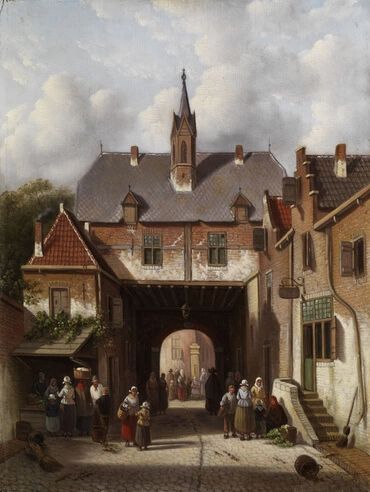1
Depois olhei, e eis que no firmamento que estava por cima da cabeça dos querubins, apareceu sobre eles uma como pedra de safira, semelhante em forma a um trono.
2
E falou ao homem vestido de linho, dizendo: Vai por entre as rodas giradoras, até debaixo do querubim, enche as tuas mãos de brasas acesas dentre os querubins, e espalha-as sobre a cidade. E ele entrou à minha vista.
3
E os querubins estavam de pé ao lado direito da casa, quando entrou o homem; e uma nuvem encheu o átrio interior.
4
Então se levantou a glória do Senhor de sobre o querubim, e passou para a entrada da casa; e encheu-se a casa duma nuvem, e o átrio se encheu do resplendor da glória do Senhor.
5
E o ruído das asas dos querubins se ouvia até o átrio exterior, como a voz do Deus Todo-Poderoso, quando fala.
6
Sucedeu pois que, dando ele ordem ao homem vestido de linho, dizendo: Toma fogo dentre as rodas, dentre os querubins, entrou ele, e pôs-se junto a uma roda.
7
Então estendeu um querubim a sua mão de entre os querubins para o fogo que estava entre os querubins; e tomou dele e o pôs nas mãos do que estava vestido de linho, o qual o tomou, e saiu.
8
E apareceu nos querubins uma semelhança de mão de homem debaixo das suas asas.
9
Então olhei, e eis quatro rodas junto aos querubins, uma roda junto a um querubim, e outra roda junto a outro querubim; e o aspecto das rodas era como o brilho de pedra de crisólita.
10
E, quanto ao seu aspecto, as quatro tinham a mesma semelhança, como se estivesse uma roda no meio doutra roda.
11
Andando elas, iam em qualquer das quatro direções sem se virarem quando andavam, mas para o lugar para onde olhava a cabeça, para esse andavam; não se viravam quando andavam.
12
E todo o seu corpo, as suas costas, as suas mãos, as suas asas, e as rodas que os quatro tinham, estavam cheias de olhos em redor.
13
E, quanto às rodas, elas foram chamadas rodas giradoras, ouvindo-o eu.
14
E cada um tinha quatro rostos: o primeiro rosto era rosto de querubim, o segundo era rosto de homem, o terceiro era rosto de leão, e o quarto era rosto de águia.
15
E os querubins se elevaram ao alto. Eles são os mesmos seres viventes que vi junto ao rio Quebar.
16
E quando os querubins andavam, andavam as rodas ao lado deles; e quando os querubins levantavam as suas asas, para se elevarem da terra, também as rodas não se separavam do lado deles.
17
Quando aqueles paravam, paravam estas; e quando aqueles se elevavam, estas se elevavam com eles; pois o espírito do ser vivente estava nelas.
18
Então saiu a glória do Senhor de sobre a entrada da casa, e parou sobre os querubins.
19
E os querubins alçaram as suas asas, e se elevaram da terra à minha vista, quando saíram, acompanhados pelas rodas ao lado deles; e pararam à entrada da porta oriental da casa do Senhor, e a glória do Deus de Israel estava em cima sobre eles.
20
São estes os seres viventes que vi debaixo do Deus de Israel, junto ao rio Quebar; e percebi que eram querubins.
21
Cada um tinha quatro rostos e cada um quatro asas; e debaixo das suas asas havia a semelhança de mãos de homem.
22
E a semelhança dos seus rostos era a dos rostos que eu tinha visto junto ao rio Quebar; tinham a mesma aparência, eram eles mesmos; cada um andava em linha reta para a frente.







